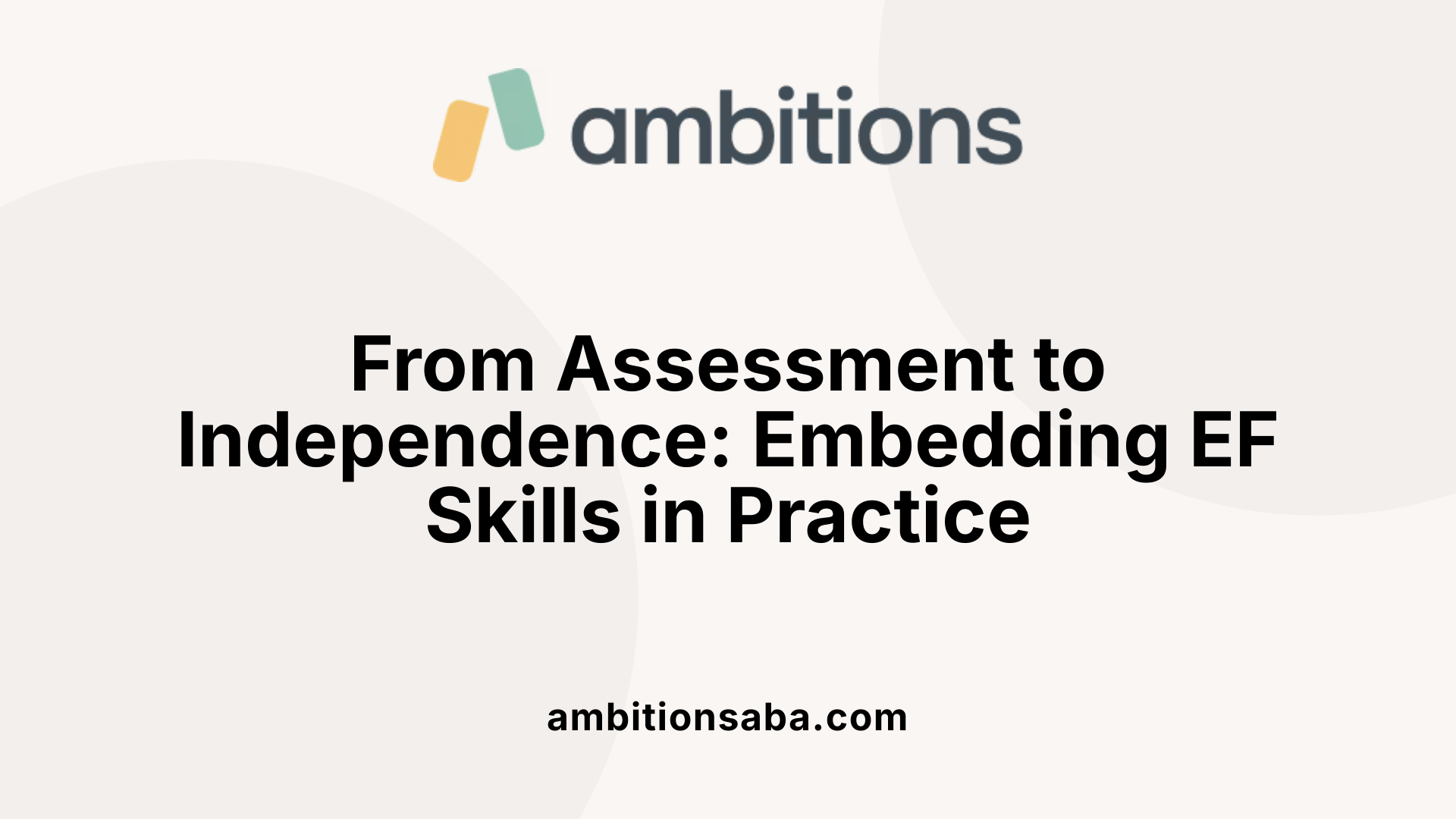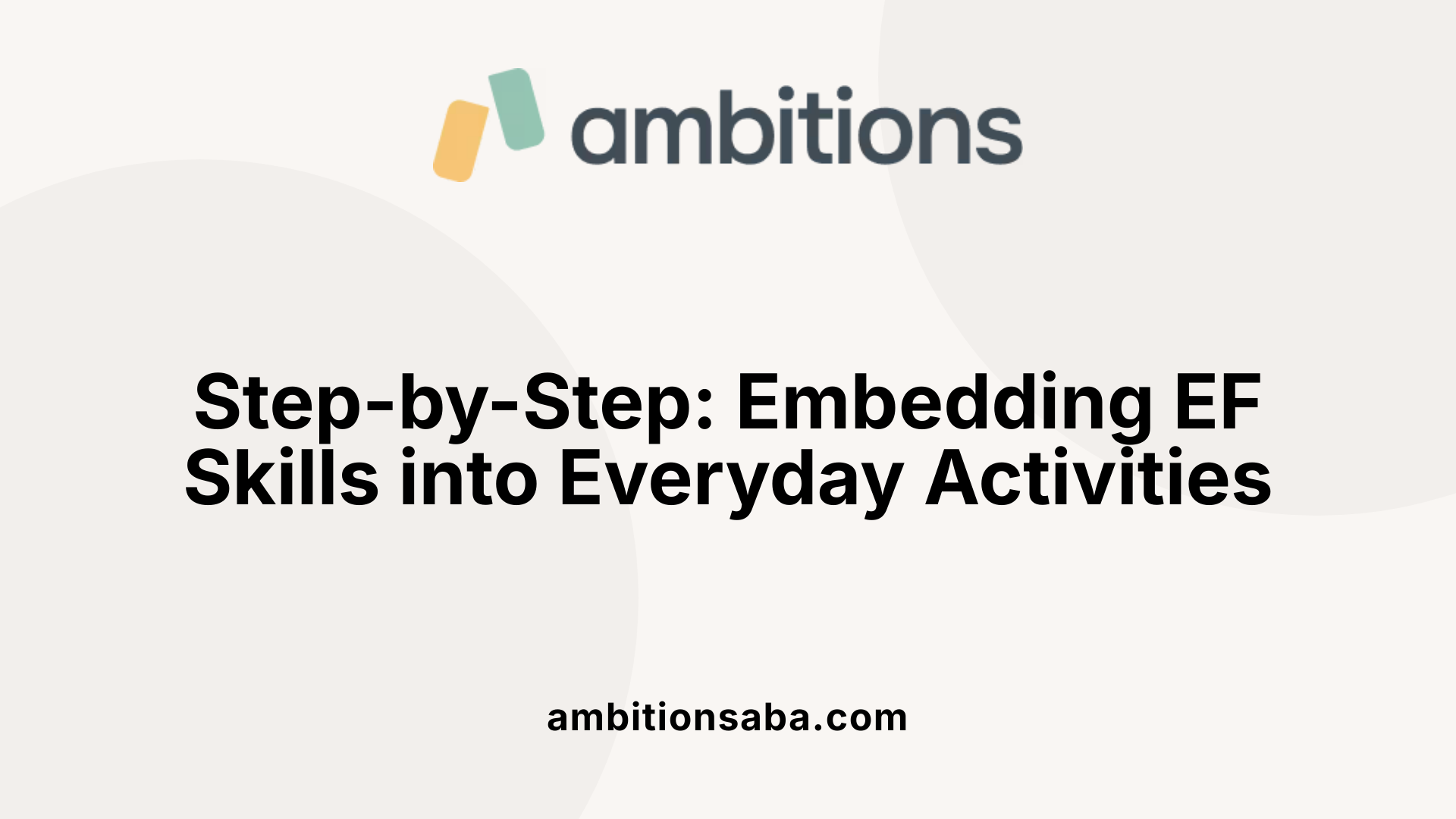Understanding How Specific Stimuli Guide Behavior in ABA Therapy
Understanding Executive Functioning and Its Significance
Executive functioning skills are vital for managing everyday tasks, academic pursuits, and social interactions. These brain-based processes include planning, organizing, problem-solving, and emotional regulation—capabilities that develop progressively throughout childhood and into early adulthood. Weaknesses in these areas can significantly impair a child's ability to function independently, especially for those with neurodevelopmental conditions such as autism spectrum disorder (ASD) and ADHD. Recognizing the importance of these skills is the first step toward fostering greater independence and success in multiple life domains.
Framework for Supporting Executive Function in Therapy

What are executive functioning skills and why are they important?
Executive functioning skills are mental processes that enable individuals to plan, organize, problem-solve, and regulate emotions. These skills are crucial for daily life, academic success, and social interactions. Core components include working memory, which involves holding and manipulating information; cognitive flexibility, or adapting to change and shifting perspectives; and inhibition control, which helps resist impulses and focus attention.
These skills develop gradually from childhood through early adulthood and can be improved with practice and supportive environments. Strong executive functions are vital for goal-directed behavior, decision-making, managing complex tasks, and maintaining mental health. Difficulties in these areas can impact a child's ability to function effectively, making support through therapy essential.
Overall, executive functioning influences how children learn, interact, and succeed in everyday activities. Strengthening these skills can foster independence and help children navigate both academic and social environments effectively.
How can ABA techniques support the development of executive functioning skills?
Applied Behavior Analysis (ABA) techniques can be highly effective in developing executive functioning skills. ABA focuses on systematically teaching and reinforcing specific skills such as task initiation, organization, and emotional regulation.
Using visual supports like schedules, checklists, and timers helps children learn to plan, prioritize, and manage time effectively. Breaking complex tasks into smaller steps with task analysis makes learning more manageable and promotes skill development across different settings.
Reinforcement strategies tailored to each child's needs increase motivation and independence. Family training ensures that these skills are practiced consistently at home, enhancing generalization.
Early assessment tools like the Behavior Rating Inventory of Executive Function (BRIEF-2) provide valuable data, allowing intervention plans to be personalized and data-driven. These strategies collectively bridge gaps in executive functioning, leading to meaningful improvements.
What interventions and strategies within ABA can help develop skills like planning, organization, problem-solving, and emotional regulation?
ABA offers various targeted interventions to bolster skills such as planning, organization, problem-solving, and emotional regulation. Key strategies include:
- Task Analysis: Breaking down complex activities into smaller, manageable steps.
- Visual Supports: Using schedules, checklists, and visual cues to structure tasks.
- Social Stories: Teaching appropriate responses and social understanding.
- Prompting and Reinforcement: Providing cues and positive reinforcement to encourage desired behaviors.
- Self-Monitoring Tools: Implementing timers and checklists to foster independence.
- Naturalistic and Functional Activities: Incorporating role-play, games, and real-life tasks to embed skills in meaningful contexts.
Consistent routines and collaboration with families further promote skill maintenance and generalization across environments.
What is the role of ABA therapy in improving executive functioning in children with autism or ADHD?
ABA therapy plays a vital role in strengthening executive functioning in children with autism and ADHD. It teaches essential skills like planning, organizing, impulse control, and emotional regulation through structured, evidence-based strategies.
Using visual aids, routines, task breakdowns, and positive reinforcement, ABA helps children develop the abilities needed to manage daily activities, make decisions, and adapt to changes.
Research indicates that intensive and sustained ABA interventions can produce significant gains in various executive domains, including problem-solving, task initiation, and flexibility.
Involvement of families and multidisciplinary teams enhances outcomes, ensuring that skills are maintained in different settings. Overall, ABA offers a scientifically supported approach to overcoming executive function challenges and fostering independence.
How can practitioners assess and embed executive functioning skills into practice using ABA approaches?
Practitioners assess executive functioning skills through behavioral observations, standardized tools such as the BRIEF-2, and detailed data collection methods like task analysis. These assessments identify specific deficits and guide they set realistic, impactful goals aimed at promoting independence and generalization.
To embed EF skills into practice, ABA providers implement targeted teaching strategies, including direct instruction, visual supports, role-playing, and naturalistic activities such as games.
Measurable goals, ongoing data collection, and collaboration with stakeholders ensure continuous progress monitoring. Incorporating tools like visual schedules, planners, and self-monitoring routines helps children apply and generalize skills effectively across different environments.
Through consistent reinforcement and systematic instruction, ABA practitioners support children in developing vital executive functioning skills that translate into greater competence in everyday life.
Practical Application of Visual Supports and Routine Building
 How can practitioners assess and embed executive functioning skills into practice using ABA approaches?
How can practitioners assess and embed executive functioning skills into practice using ABA approaches?
Practitioners assess executive functioning (EF) skills through a combination of behavioral observations and standardized assessment tools like the Behavior Rating Inventory of Executive Function (BRIEF-2) and the BASC. They also use detailed data collection methods such as task analyses, and frequency or duration measures to identify specific skill gaps.
Once assessments are complete, practitioners set priorities for intervention. They focus on goals that promote independence, help children generalize skills across different settings, and meet immediate needs. Embedding EF skills into practice involves targeted teaching strategies: direct instruction, visual supports, role playing, and naturalistic activities like games.
To reinforce these skills, practitioners use visual schedules, checklists, and timers that outline step-by-step instructions. Collaboration with families and educators ensures these strategies are consistently applied, and progress is tracked through ongoing data collection. This consistent reinforcement helps children develop crucial skills like impulse control, working memory, cognitive flexibility, and emotional regulation.
How can practitioners embed EF skills into everyday routines?
Embedding EF skills into daily routines starts with establishing clear, consistent schedules supported by visual aids. Visual schedules and checklists help children anticipate upcoming activities and manage their time more effectively. Using timers reinforces the understanding of time management.
Structured routines offer predictability, which reduces anxiety and fosters independence in tasks such as dressing, meal prep, or completing schoolwork. Incorporating goal-setting routines and encouraging self-monitoring—like using visual checklists or self-talk—helps children become responsible for their actions.
Practitioners also include mindfulness practices, such as deep breathing during transitions, to improve emotional regulation. Collaborating with families and educators ensures these routines are reinforced across different environments, supporting the generalization and maintenance of EF skills.
How does ABA foster the generalization of executive functioning skills across environments and social contexts?
ABA promotes skill generalization by designing interventions that are consistent across various settings and involving collaboration among caregivers, teachers, and other stakeholders. Teaching skills in meaningful contexts—such as play, role play, and real-life scenarios—enhances their relevance and transferability.
Using visual supports like schedules and checklists consistently across settings helps children recognize and apply skills independently. Ongoing data collection and progress monitoring allow practitioners to adjust interventions as needed.
Providing children with opportunities to practice skills with different people and in multiple environments fosters adaptability and confidence. This comprehensive approach ensures that improvements in EF skills are sustained and relevant across social and environmental contexts.
Moving Forward: Supporting Growth in Executive Functions
Supporting executive functioning skills through ABA is a comprehensive, personalized process that involves systematic assessment, targeted interventions, and naturalistic practice in everyday routines. By utilizing visual supports, task breakdowns, positive reinforcement, and collaboration with families and educators, practitioners can help children develop vital skills that foster independence and improve overall functioning. Early and consistent intervention maximizes potential gains in executive skills, which are foundational for success in school, social settings, and future personal endeavors. With ongoing support and tailored strategies, children can build stronger executive functions, enabling them to navigate complex tasks and challenges with confidence and independence.
References
- Unlocking Independence: Teaching Executive Functioning Skills ...
- executive functioning and ABA - T-Ten Services
- ABA Therapy for Executive Dysfunction - Award Behavioral Health
- How ABA Therapy Supports Executive Functioning in Children with ...
- How to Support Executive Functioning Skills - The Birchtree Center
- [PDF] Teaching Executive Function
- Unlocking Independence: Teaching Executive Functioning Skills ...
- ABA Therapy and Executive Functioning: Building Skills for Success

